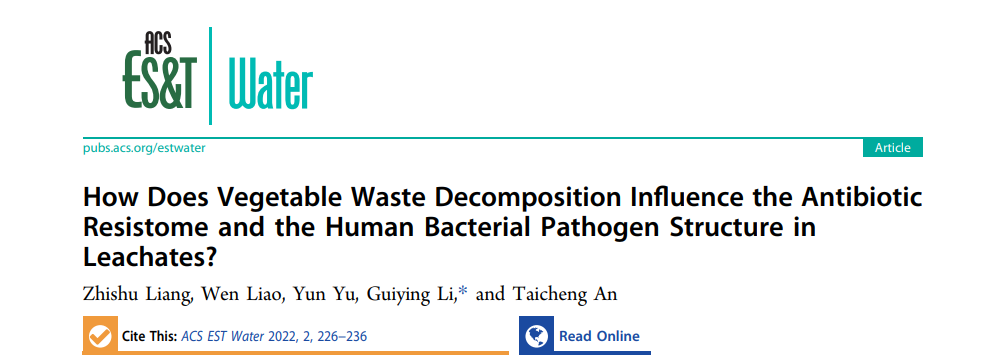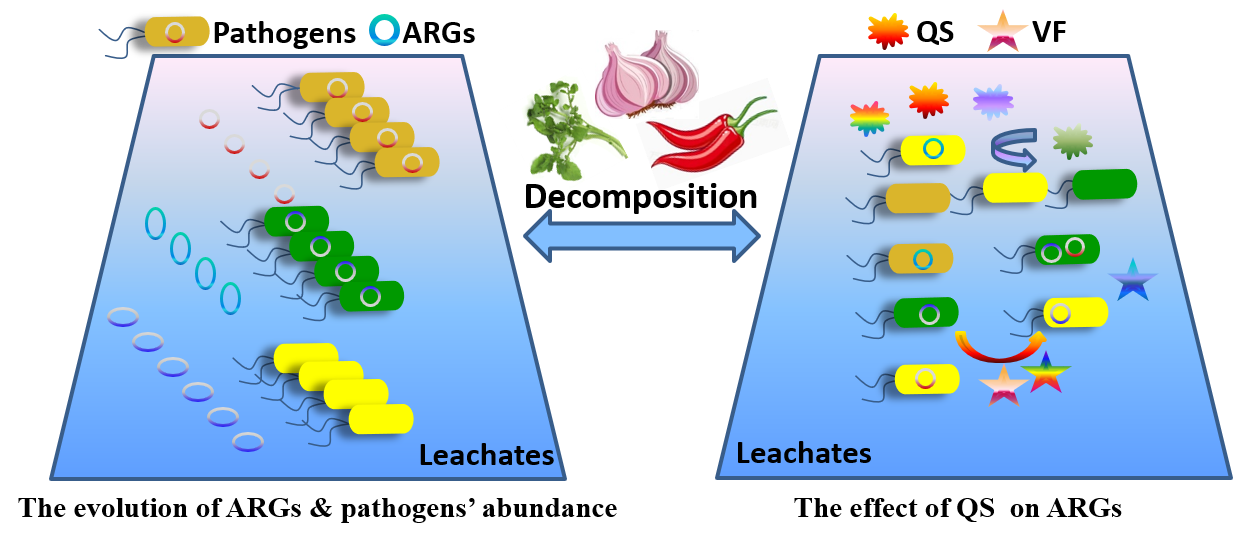近日,广东工业大学环境健康与污染控制研究院、环境科学与工程学院安太成教授团队在蔬菜垃圾发酵对渗滤液中抗生素耐药基因丰度和致病菌的菌群结构及功能的影响方面取得最新进展,研究成果以《How Does Vegetable Waste Decomposition Influence the Antibiotic Resistome and the Human Bacterial Pathogen Structure in Leachates》为题发表在ACS ES&T Water 上。论文的第一作者为梁志梳副教授,通讯作者为李桂英教授。该研究通过构建垃圾发酵反应器模拟蔬菜垃圾发酵过程,阐明发酵渗滤液中的抗生素抗性基因(ARGs)丰度和多样性以及致病菌的菌群结构和功能,揭示了蔬菜垃圾发酵影响渗滤液中ARGs丰度和致病菌的菌群结构及功能的机制。这些发现可以为进一步优化渗滤液处理过程,减少ARGs在水生环境中的传播和健康风险提供指导。

探明生活垃圾渗滤液中的抗生素耐药基因(ARGs)和致病菌是如何导致抗生素耐药性获得的具有深远意义。本研究探讨了蔬菜垃圾分解对垃圾渗滤液中ARGs丰度和多样性及病原菌结构和功能的影响机制,发现西洋菜垃圾发酵渗滤液具有较高的ARG多样性,其丰度(2.17 × 107copies/mL)也要高于辣椒(1.27 × 107copies/mL)和洋葱垃圾(4.93 × 105copies/mL)。蔬菜垃圾发酵前期会升高渗滤液中ARGs的丰度,但随着发酵时间的延长ARG的丰度反而降低。多重耐药基因、氨基糖苷类、β-内酰胺类和四环素类是主要的ARG类型,主要抗性机制是抗生素失活。ARGs亚型间共现性要优于亚型内的共现性,表明渗滤液中抗生素的选择压力和协同抗性共同塑造着抗生素的抗性谱。蔬菜垃圾发酵渗滤液中病原菌群落变化显著。ARGs与优势致病菌肠球菌(Enterococcus)呈正相关,与巴尔通体(Bartonella)和拟杆菌(Bacteroides)呈负相关。宏基因组分析揭示三种垃圾发酵菌群的功能基因主要与碳水化合物(9.2%)和氨基酸运输代谢(8.2%)有关,且ARGs与防御型毒力因子和自诱导因子呈正相关。群体感应系统通过平衡信号分子合成基因和降解基因表达来调节ARGs水平。这些发现为有助于了解蔬菜垃圾发酵对渗滤液中ARGs发生和传播的贡献。
论文网址:https://doi.org/10.1021/acsestwater.1c00392
图表摘要:

论文内封面:

英文摘要:
Understanding how antibiotic-resistance genes (ARGs) and pathogens in household waste leachates contribute to acquiring antibiotic resistance is profoundly significant. Leachates can impair water quality and harm the environment and human health. This study explored co-occurrence and accumulation of pathogens and ARGs in leachates during decomposition of vegetable wastes. Watercress leachates had more average ARG numbers and abundance. ARG abundances were 2.17 × 107copies/mL for pepper, 1.27 × 107copies/mL for watercress, and 4.93 × 105copies/mL for onion. Vegetable decomposition enriched ARGs first and then decreased. Genes conferring resistance to multidrug, aminoglycosides, and β-lactam were the dominant ARGs; the main mechanism was antibiotic deactivation. Preferential co-occurrence patterns were observed across ARG types, indicating coeffects of antibiotic selection pressure and coresistance when shaping the antibiotic resistome. The pathogenic community varied significantly during vegetable decomposition. ARG levels positively correlated with the dominant Enterococcus but negatively correlated with Bartonella and Bacteroides. Functional genes shared by all waste leachates were mainly linked to carbohydrate (9.2%) and amino acid transport and metabolism (8.2%). ARGs were positively associated with defensive virulence factors and autoinducers. The quorum sensing system regulated ARG levels by balancing signal molecule synthesis and degradation gene expression. These findings provide insights into the mechanism underlining vegetable waste decomposition regarding occurrence and spread of ARGs in leachates.
资助项目:本研究受到国家自然科学基金(U1901210, 41877363, 41807405),广东省自然科学基金(2019A1515010599),广州市科技计划项目(201704020185),广东省本土创新团队项目(2017BT01Z032)的资助。